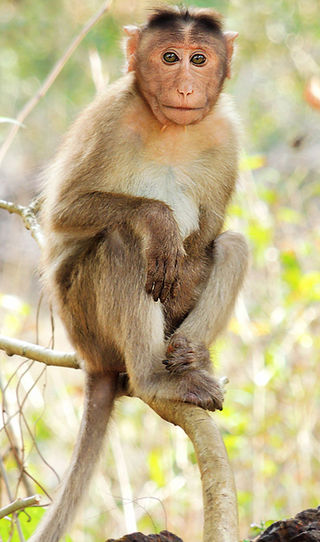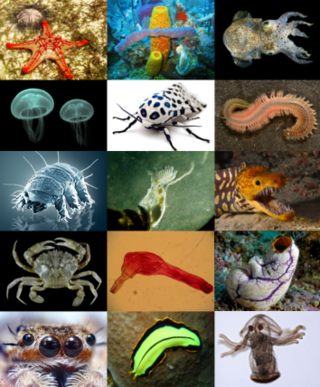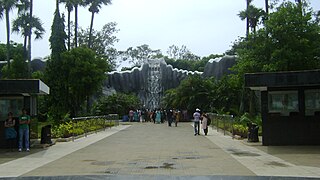
Abalone is a common name for any of a group of small to very large marine gastropod molluscs in the family Haliotidae, which contains only one genus Haliotis. Other common names are ear shells, sea ears, and, rarely, muttonfish or muttonshells in parts of Australia, ormer in the UK, perlemoen in South Africa, and pāua in New Zealand. The number of abalone species recognized worldwide ranges between 30 and 130 with over 230 species-level taxa described. The most comprehensive treatment of the family considers 56 species valid, with 18 additional subspecies.

Food is any substance consumed by an organism for nutritional support. Food is usually of plant, animal, or fungal origin and contains essential nutrients such as carbohydrates, fats, proteins, vitamins, or minerals. The substance is ingested by an organism and assimilated by the organism's cells to provide energy, maintain life, or stimulate growth. Different species of animals have different feeding behaviours that satisfy the needs of their metabolisms and have evolved to fill a specific ecological niche within specific geographical contexts.
Speciesism is a term used in philosophy regarding the treatment of individuals of different species. The term has several different definitions within the relevant literature. Some sources specifically define speciesism as discrimination or unjustified treatment based on an individual's species membership, while other sources define it as differential treatment without regard to whether the treatment is justified or not. Richard Ryder, who coined the term, defined it as "a prejudice or attitude of bias in favour of the interests of members of one's own species and against those of members of other species." Speciesism results in the belief that humans have the right to use non-human animals, which scholars say is pervasive in the modern society. Studies from 2015 and 2019 suggest that people who support animal exploitation also tend to endorse racist, sexist, and other prejudicial views, which furthers the beliefs in human supremacy and group dominance to justify systems of inequality and oppression.

The European bison or the European wood bison, also known as the wisent, the zubr, or sometimes colloquially as the European buffalo, is a European species of bison. It is one of two extant species of bison, alongside the American bison. The European bison is the heaviest wild land animal in Europe, and individuals in the past may have been even larger than their modern-day descendants. During late antiquity and the Middle Ages, bison became extinct in much of Europe and Asia, surviving into the 20th century only in northern-central Europe and the northern Caucasus Mountains. During the early years of the 20th century, bison were hunted to extinction in the wild.

Crayfish are freshwater crustaceans belonging to the infraorder Astacidea, which also contains lobsters. Taxonomically, they are members of the superfamilies Astacoidea and Parastacoidea. They breathe through feather-like gills. Some species are found in brooks and streams, where fresh water is running, while others thrive in swamps, ditches, and paddy fields. Most crayfish cannot tolerate polluted water, although some species, such as Procambarus clarkii, are hardier. Crayfish feed on animals and plants, either living or decomposing, and detritus.

Sir David Frederick Attenborough is a British broadcaster, biologist, natural historian, and writer. He is best known for writing and presenting, in conjunction with the BBC Natural History Unit, the nine natural history documentary series forming the Life collection, a comprehensive survey of animal and plant life on Earth.

Joaquin Rafael Phoenix is an American actor. Known for playing dark, unconventional and eccentric characters in independent film, in particular period dramas, he has received various accolades, including an Academy Award, a British Academy Film Award, a Grammy Award, and two Golden Globe Awards. In 2020, The New York Times named him one of the greatest actors of the 21st century.

David Pearce is a British transhumanist philosopher. He is the co-founder of the World Transhumanist Association, currently rebranded and incorporated as Humanity+. Pearce approaches ethical issues from a lexical negative utilitarian perspective.

Paris Saint-Germain Football Club, commonly referred to as Paris Saint-Germain or simply PSG, is a professional football club based in Paris, France. They compete in Ligue 1, the top division of French football. As France's most successful club, they have won 50 official honours, including twelve league titles and one major European trophy. Their home ground is the Parc des Princes, located in the 16th arrondissement of Paris near the Boulogne-Billancourt commune.

World of Warcraft (WoW) is a massively multiplayer online role-playing game (MMORPG) released in 2004 by Blizzard Entertainment. Set in the Warcraft fantasy universe, World of Warcraft takes place within the world of Azeroth, approximately four years after the events of the previous game in the series, Warcraft III: The Frozen Throne. The game was announced in 2001, and was released for the 10th anniversary of the Warcraft franchise on November 23, 2004. Since launch, World of Warcraft has had nine major expansion packs: The Burning Crusade (2007), Wrath of the Lich King (2008), Cataclysm (2010), Mists of Pandaria (2012), Warlords of Draenor (2014), Legion (2016), Battle for Azeroth (2018), Shadowlands (2020), and Dragonflight (2022). Three further expansions, The War Within, Midnight, and The Last Titan, were announced in 2023.

Chick culling or unwanted chick killing is the process of separating and killing unwanted chicks for which the intensive animal farming industry has no use. It occurs in all industrialised egg production, whether free range, organic, or battery cage. However, some certified pasture-raised egg farms are taking steps to eliminate the practice entirely. Worldwide, around 7 billion male chicks are culled each year in the egg industry. Because male chickens do not lay eggs and only those in breeding programmes are required to fertilise eggs, they are considered redundant to the egg-laying industry and are usually killed shortly after being sexed, which occurs just days after they are conceived or after they hatch. Some methods of culling that do not involve anaesthetics include: cervical dislocation, asphyxiation by carbon dioxide, and maceration using a high-speed grinder. Maceration is the primary method in the United States. Maceration is often a preferred method over carbon dioxide asphyxiation in western countries as it is often considered as "more humane" due to the deaths occurring immediately or within a second.

Monkey is a common name that may refer to most mammals of the infraorder Simiiformes, also known as the simians. Traditionally, all animals in the group now known as simians are counted as monkeys except the apes. Thus monkeys, in that sense, constitute an incomplete paraphyletic grouping; however, in the broader sense based on cladistics, apes (Hominoidea) are also included, making the terms monkeys and simians synonyms in regard to their scope.

Dog meat is the flesh and other edible parts derived from dogs. Historically, human consumption of dog meat has been recorded in many parts of the world.

Stephen Robert Irwin, known as "The Crocodile Hunter", was an Australian zookeeper, conservationist, television personality, wildlife educator, and environmentalist.

Animals are multicellular, eukaryotic organisms in the biological kingdom Animalia. With few exceptions, animals consume organic material, breathe oxygen, have myocytes and are able to move, can reproduce sexually, and grow from a hollow sphere of cells, the blastula, during embryonic development. Animals form a clade, meaning that they arose from a single common ancestor.

Animal Crossing: New Leaf is a 2012 social simulation game developed and published by Nintendo for the Nintendo 3DS. In the game, the player controls a human character who takes on the role of mayor in a town populated with anthropomorphic animals. As the fourth main title in the Animal Crossing series, it was released in Japan in November 2012, and in 2013 in international territories.

Arignar Anna Zoological Park, also known as the Vandalur Zoo, is a zoological garden located in Vandalur, to southwest of Chennai, Tamil Nadu, about 31 kilometres (19 mi) from the Chennai Central and 15 kilometres (9.3 mi) from Chennai Airport. Established in 1855, it is the second public zoo in India. It is affiliated with the Central Zoo Authority of India. Spread over an area of 602 hectares, including a 92.45-hectare (228.4-acre) rescue and rehabilitation centre. The zoo houses 2,553 species of flora and fauna across 1,265 acres (512 ha). As of 2012 the park houses around 1,500 wild species, including 46 endangered species, in its 160 enclosures. As of 2010, there were about 47 species of mammals, 63 species of birds, 31 species of reptiles, 5 species of amphibians, 28 species of fishes, and 10 species of insects in the park. The park, with an objective to be a repository of the state's fauna, is credited with being the second wildlife sanctuary in Tamil Nadu after Mudumalai National Park.
Animal Ethics is a nonprofit organization formed to promote discussion and debate around issues in animal ethics and to provide information and resources for animal advocates. They also do outreach work in several countries on the issue of speciesism. Their aim is to create a world where moral consideration is extended to all sentient beings. The organization's website covers topics such as speciesism, sentience, veganism and wild animal suffering and has content translated into several languages.

The World Day for the End of Fishing (WoDEF) is an international campaign launched by animal rights activists that demand the end of fishing practices. It takes place on the last Saturday of March every year.

















